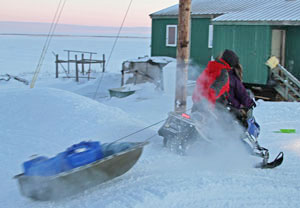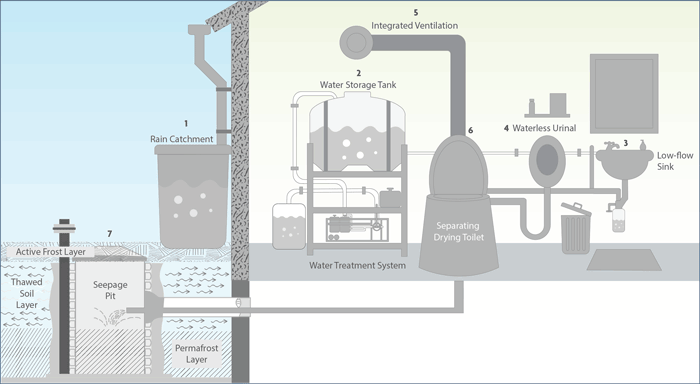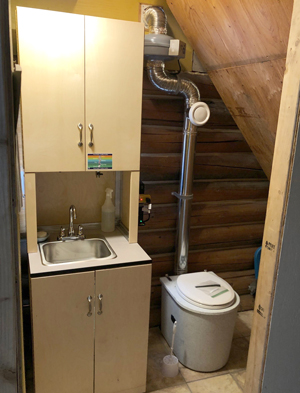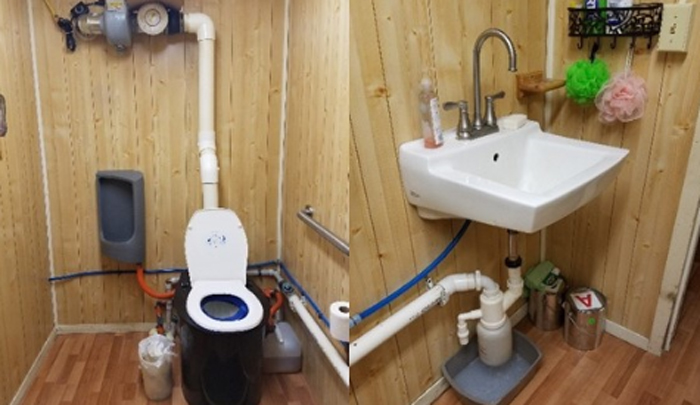Portable Alternative Sanitation System (PASS)
- Need: To bring low-cost water and sanitation improvements to homes in tribal villages in Alaska without access to piped water or sewer systems.
- Intervention: The Portable Alternative Sanitation System (PASS) treats hauled water, provides for handwashing with clean water, and disposes waste without traditional piping.
- Results: Residents in the pilot project reported that PASS was cleaner and healthier than the self-haul method.
Description
 In the tribal village of Kivalina in
the northwestern part of Alaska, residents' houses have
no piped water or sewer system. A lack of piped water to
the home results in severe rationing and water reuse
practices such as handwashing in soiled basin water.
Toilets consist of a five-gallon bucket with a trash bag
inside, and residents haul their own waste to the
landfill. This lack of available sanitation and potential
exposure to sewage can lead to water contamination and
health concerns.
In the tribal village of Kivalina in
the northwestern part of Alaska, residents' houses have
no piped water or sewer system. A lack of piped water to
the home results in severe rationing and water reuse
practices such as handwashing in soiled basin water.
Toilets consist of a five-gallon bucket with a trash bag
inside, and residents haul their own waste to the
landfill. This lack of available sanitation and potential
exposure to sewage can lead to water contamination and
health concerns.
To address this lack of plumbing, the Alaska Native Tribal Health Consortium (ANTHC), along with the Cold Climate Housing Research Center, Lifewater Engineering Company, and CampWater Industries, designed the Portable Alternative Sanitation System (PASS). PASS is a low-cost water and sanitation system that does not require traditional piping. The portable components allow the system to be moved if the homeowner has to relocate due to climate impacts, such as permafrost melt, erosion, or flooding.
The pilot program was funded by the Indian Health Service (IHS) and ANTHC.
Services offered
PASS comprises the following components:
- Rain catchment system
- Water treatment system to ensure safe drinking water for the home
- 50- or 100-gallon water storage tank
- Low-flow sink and waterless urinal
- Toilet that separates solid waste from liquid
- Ventilation system to dry out solid waste, eliminating odor and easing the hauling-out process

Results
August 2016 marked the first completed year of the Kivalina PASS pilot project, in which nine households participated. Residents reported that PASS was healthier, cleaner, and less work-intensive than the previous "honey bucket" self-hauling system.

In March 2019, the PASS project went into its full manufacturing phase. In 2019-2020, 24 additional units in Kivalina and 21 in Mertarvik, the relocation village of Newtok, have been installed. In 2022-2023, PASS was installed in 19 homes in Kotlik.
PASS 2.0 has been reengineered and installed in 7 rural communities that lack piped infrastructure: Kivalina, Oscarville, Mertarvik, Chalkyitsik, Allakaket, Alatna, and Kotlik.
In 2020, the PASS partners designed a Mini-PASS, which provides a handwashing station and a vented honey bucket. This system fills the gap of space constraints in rural Alaskan homes. The toilet does not have the seepage pit, but it still has the ventilation drying component. With funding from a private donor, the CDC Foundation was able to fund the installation of over 350 units in 15 Alaskan communities.
Challenges
Acquiring funding to design and pilot this innovative system was challenging, since traditional funders want to see the project be successful before they invest. In addition, remote logistic challenges and high transportation costs complicate any response to needs within the community.
Another challenge is obtaining permits for the seepage pits.
While the systems provide a significant improvement over current water and sanitation practices in unpiped homes, PASS is still an intermediate step toward providing full water and sewer systems for all tribal communities in Alaska.
Replication
In order to replicate this project successfully, a team needs to build good rapport with community members and ensure that onsite training is adequate and comprehensive so that residents are able to operate and maintain the systems with very little assistance.
Another component is setting up a response system that includes local labor knowledgeable about the system. ANTHC hires local labor to help install the systems and recommends setting up an informal system where homeowners are able to call locally and receive help with troubleshooting, maintenance, and repairs.

Contact Information
Mia Heavener, P.E. Civil EngineerAlaska Native Tribal Health Consortium (ANTHC)
mia.heavener@anthc.org
Topics
Infrastructure
· Tribal communities
States served
Alaska
Date added
November 14, 2016
Suggested citation: Rural Health Information Hub, 2024 . Portable Alternative Sanitation System (PASS) [online]. Rural Health Information Hub. Available at: https://www.ruralhealthinfo.org/project-examples/933 [Accessed 28 February 2026]
Please contact the models and innovations contact directly for the most complete and current information about this program. Summaries of models and innovations are provided by RHIhub for your convenience. The programs described are not endorsed by RHIhub or by the Federal Office of Rural Health Policy. Each rural community should consider whether a particular project or approach is a good match for their community’s needs and capacity. While it is sometimes possible to adapt program components to match your resources, keep in mind that changes to the program design may impact results.
